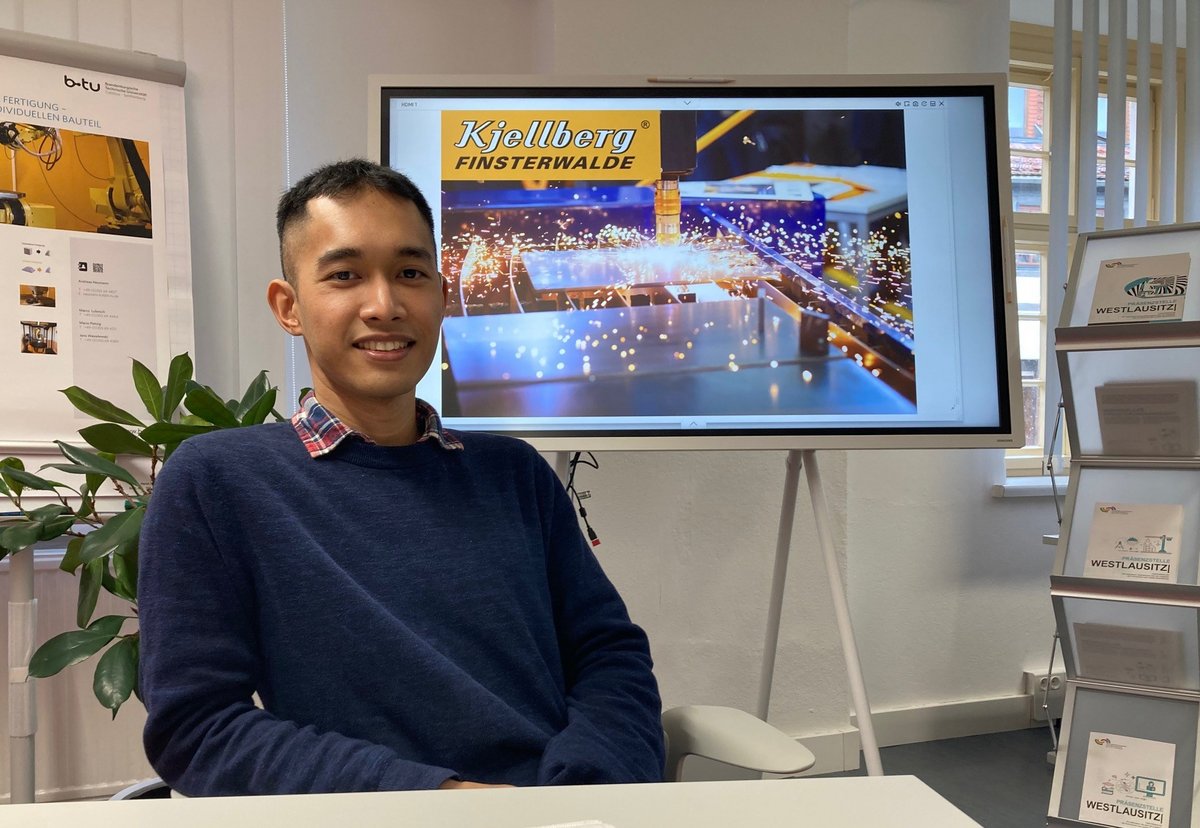Interview with BTU Alumnus Rama Akhira Vedaalaana Sitepu (Elektrotechnik)
Rama Akhira Vedaalaana Sitepu came to Germany from Indonesia and completed his master's degree in electrical engineering at the BTU in Senftenberg. He had previously completed his bachelor's degree in Karlsruhe. For him, the connection to practice at the BTU was enormously important, even if he would have liked more attendance times at the university in times of the pandemic. He now works for the "hidden champion" Kjellberg in Finsterwalde.
Hello Rama, how did you decide to study at the BTU?
I never really wanted to study in Germany, I wanted to join the Indonesian Air Force, but my parents weren't enthusiastic about that. So I came to Karlsruhe and started my bachelor's degree there at the University of Applied Sciences. I studied mechatronics with a focus on aeronautical engineering, which suited my enthusiasm for flying. I then completed my master's degree at the BTU because I saw that the BTU was implementing great projects, for example with Rolls Royce. So I thought maybe I could benefit from that and came to the BTU in Senftenberg. The university impressed me a lot because of the modern equipment. Normally, universities are always time-honored and also a little dusty, but that is completely different in Cottbus and Senftenberg. I would have liked to be on campus every day, but Corona made things difficult.
You always worked as a student trainee and did internships during your studies, what experiences did you have?
I have always believed that it would be better to combine theory with practice, so I have always had working student jobs on the side to gain experience and directly apply theoretical knowledge in practice. In reality, you always realize that problems arise that you don't expect in theory. Again, I think it's important to dovetail that. Unfortunately, it wasn't that easy to get a working student position during the pandemic. That's when a friend recommended that I apply for the Deutschlandstipendium scholarship, and I got the scholarship from Kjellberg Finsterwalde. I then thought that I could also write my master's thesis at Kjellberg to give something back to the company as well. My colleagues put me to work on a challenging project and I am allowed to continue this project after finishing my thesis, which shows me that the company also appreciates my work.
What exactly do you do now professionally and what is special about Kjellberg Finsterwalde?
I work as a development engineer at Kjellberg and develop test equipment for the company's products. Here, safety is paramount because work is done with high voltage and overpressure, so testing has to be very precise and safe. It's a demanding and challenging job that I really enjoy. The special thing about Kjellberg Finsterwalde is, on the one hand, that they work with innovative technologies. You wouldn't expect that at first glance. With these technologies, you can also implement projects in the future that you might not even think of today. Working at Kjellberg, a hidden champion, is a great opportunity. I also received a lot of support, especially from my supervisors Jens Friedel, Head of Development, and Martin Ringel, Development Engineer Electronics/Hardware, for which I am very grateful.
Do you have any tips for foreign students that you would give them?
Studying in Germany is at a very high level. Almost 60% of the students from Indonesia did not graduate. Therefore, I can only advise everyone to manage their time well and to persevere even if difficulties arise. It is definitely worth it! Lusatia is a beautiful place to live and work. I was particularly surprised by how friendly and open-minded the people here were. I had been told otherwise, but I am happy that I have really arrived here.
Kontakt
Abteilung Wissens- und Technologietransfer
T +49 (0) 3531 516 033 9
silke.soeldner(at)b-tu.de

